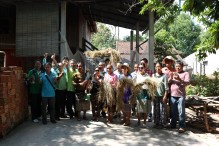The Laos Farmers Network won the Knowledge Management (KM) Award in 2014 which consisted of a cash prize which they can use to visit any MTCP2 country to learn about a particular technology or theme. They have identified the experiences of the Farmer and Nature Net as something they can learn from and potentially apply in their own country and communities. Last December 12-15, the Farmer to Farmer Exchange happened in Cambodia, with FNN as host and LFN farmer leaders and staff as learners.

(Lao Farmers Network leaders and staff visit the organic national rice mill in Phnom Penh owned by FNN and CEDAC. © 2015 MTCP2/Jun Virola)
A few days before the visit, the MTCP2 RIA Knowledge Management Officer to Cambodia to facilitate the process of systematization of FNN’s experiences and lessons learned. Composed of the Executive Director, present and past presidents, as well as district and provincial leaders, and the KM officer, the systematization team organized relevant information and identified lessons learned. The four themes, which LFN itself has identified, are: functional and sustainable farmer network, marketing, organic production, and savings group and rice mill cooperative.

(AFA KM Officer with FNN farmer leaders systematize their experiences in preparation for learning visit. © 2015 MTCP2/Jun Virola.)
At the start of the learning visit, the Laos farmer leaders and staff were organized into four groups corresponding to the four learning themes identified. Each group then identified the problems and issues they are facing, the improvements they want to make, and the specific learning objectives or questions they would like to be addressed in the visit. This made the learning exchange more targeted, concrete and responding to real needs and situations. This also corresponded to the first phase of the definition of an implementation plan for adopting and innovating on what they have learned in their own situations.

(Lao Farmers Network leaders identify issues and problems, points for improvement and specific learning objectives and questions to make the learning visit more targeted and responsive to concrete needs and situations. © 2015 MTCP2/Jun Virola)
The case presentations were followed by field visits in the next two days. The first visit was to the office of FNN in Phnom Penh. From the presentation of FNN Executive Director Pan Sopheap and the dialogue with farmer leaders including current president Seu Rany and past president Uon Sophal, participants learned about the importance of having clear goals and strategies, leadership roles, support from government, and sustainability through social and institutional funds. The participants gained insight on how FNN members develop trust in the leadership and greater involvement through a structure that links national to the provincial, district and commune levels, as well as the member contribution through the social and institutional fund.

(Executive Director Pan Sopheap presents FNN’s timeline showing its development, challenges and milestones. © 2015 MTCP2/Jun Virola.)
The second visit was to the Natural Agriculture Products (NAP) shops of CEDAC in Phnom Penh as well as the CEDAC enterprise. The NAP shops are outlets for organic products supplied by farmers, most of whom are members of FNN, while the enterprise has a warehouse that receives and packs farmers’ produce for distribution to the NAP outlets. Participants learned about the importance of building trust among customers on organic products as well as responding to the challenges of ensuring reliable supply by farmers as well as responding to customer demands. They were also interested to learn about the sharing of benefits and risks between the enterprise and shop on the one hand, and the supplying farmers on the other.

(Lao Farmers Network discuss marketing issues with NAP shop manager in Phnom Penh. © 2015 MTCP2/Jun Virola.)
The third visit was to an organic farm of a woman farmer leader of a producer group in Takeo. She grows rice and vegetables and raises poultry and livestock organically. She uses animal manure to produce organic fertilizer in her farm. She has won an award from CEDAC as outstanding organic producer and demonstrated to participants her latest innovation of a rice thresher that uses a small machine and locally available materials.
The fourth visit was to the rice mill cooperative of FNN in Takeo. From a small rice mill a few years ago, it has grown into a bigger one from the re-investment of its profit as well as the continued contribution from the saving group members who are also members of the rice mill cooperative. Beside the rice mill is a rice dryer that uses an oven-type heating system and a farmer knowledge of testing moisture content by simply breaking the grains and looking at its texture. The rice mill and the savings groups are intimately linked, each one sustaining the other.
At the end of the visits, the visiting farmer leaders from Laos shared their learnings and insights and asked further questions from FNN leaders as they prepare for a summing up and planning the next day on ideas they can apply back home.
The learning exchange is the first one organized by MTCP2 RIA and borrows ideas and techniques for systematization and structuring of learning experiences from PROCASUR’s Learning Route. It was conducted with support of IFAD, SDC and the EU, and was facilitated by MTCP2 RIA/AFA and hosted by FNN.




Comments are closed